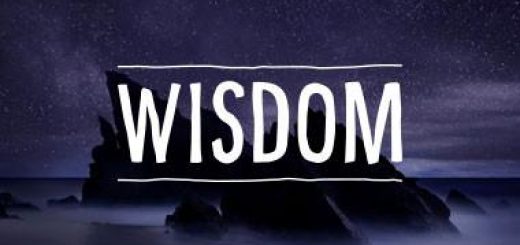Body parts
Let me tell you a story.
 There were once three men called Korah, Dathan and Abiram. They were from the tribe of Levi, the people set aside to serve in the Tabernacle.
There were once three men called Korah, Dathan and Abiram. They were from the tribe of Levi, the people set aside to serve in the Tabernacle.
Now this was not enough for these three men. They thought they could do a better job than the current leadership. And they had 250 men who agreed with them. Well known community leaders at that.
Who do you think you are?
they said to Moses and Aaron.
The people of Israel are all chosen. We are all holy. We are all set apart. What makes you so special?
Moses was sad. He knew this could never end well. He knew that in the morning, God would display His power and make it very clear who He wanted in charge. And how He would deal with the rest.
Really? Are you sure you really want to do this? Are you sure you’re ready for this? Is it not enough to be part of the special Levite tribe? What’s Aaron ever done to you?
When Moses summoned Dathan and Abiram, they would not come –
You dragged us out of a land of plenty and promised a land of even more plenty….and yet here we still are in this wilderness! Who are you to tell us what to do? What gave you the right to treat us like slaves? NO, we’re not coming.
Unsurprisingly, this made Moses pretty angry. He told God not to listen to them and protested that he had done nothing wrong. He told Korah and all the men to each bring a censer to present before God then next day.
 He begged God for mercy. He could guess what was coming. He wanted everyone to be sure it was God’s doing and not his own.
He begged God for mercy. He could guess what was coming. He wanted everyone to be sure it was God’s doing and not his own.
Move away from the area! Move away from the tents of these men. Trust me, you’re not going to want to be around when God’s wrath is unleashed!
Then the earth swallowed them up. Literally. The earth split open and the three dissenters and all their wives and children disappeared down into the ground never to be seen again. The 250 supporters who were offering incense were consumed by fire. The bronze censers were gathered up and hammered out to overlay the altar –
This was to remind the Israelites that no one except a descendant of Aaron should come to burn incense before the Lord, or he would become like Korah and his followers. Numbers 16:40
It still wasn’t over. The next day, the Israelite community complained that Moses and Aaron had killed their friends and neighbours, their colleagues and fellow Israelites. They held Moses and Aaron responsible. They still didn’t get it.
By this point, God had had enough. He wanted to put an end to all this once and for all. But Moses told Aaron to hurry before it was too late. He could still make a difference.
“Take your censer and put incense in it, along with burning coals from the altar, and hurry to the assembly to make atonement for them. Wrath has come out from the Lord; the plague has started.” Numbers 16:46
The plague had already started but Aaron stood between the living and the dead and the plague stopped. 14,700 people died from the plague that day. Along with all those with the three men called Korah, Dathan and Abiram.
THE END
Well, there’s a cheery tale for you for a dreary Monday morning!
What on earth can we take from that, I hear you wonder!
I believe there is something in this about each of us knowing our place. Not in a negative sense, but in the sense of finding peace in the role we have been given and allowing other people to get on with theirs. It’s about not undermining those who are in authority over us. It’s about getting on with what we have been asked to do, even if we can come up with a thousand and one reasons why we would rather be doing something else.
I have never been great with authority. I’ve always been one of those people who as soon as they are told not to do something, that is the thing they want to do most in the world. And when I’m told to join in or clap along or respond in a certain way, then I dig my heels in and resolutely refuse to move. I’m not alone, I suspect.
I have always believe that respect has to be earned and that leaders have to justify their position and be above reproach for their leadership to be authentic.
But recently I’ve changed my mind. I now do a job where I turn up and ask ‘What do you want me to do today?’ and whatever it is, I get on with it, no questions asked. There’s a real release in that actually. I go with the flow, let the management make the decisions (and take the rap!). It’s been really, really good for me. It’s taught me an awful lot about respect and humility and being the best I can be. There’s a satisfaction to be had from doing a job well, no matter how menial the task.
We don’t have to agree with every decision. We don’t have to understand the thinking behind every move. We have to find a way to support our leaders. We have to learn to do what we are told. We have to learn to trust. Trust God, even if we can’t wholeheartedly trust our leader every stop of the way. Trust that God knows what He is doing and that He is working through the appointed leader. He knows their flaws and yet, He chose them and is working through them. Just like Moses and Aaron. As I said, there is a peace to be found in living with this acceptance.
Of course, sometimes leaders and managers go too far. We cannot always keep our heads down and ignore blatant wrongdoing. Nor can we agree to do something that we know is illegal or unethical. Sometimes we cannot turn a blind eye to injustice and exploitation. Sometimes we have to stand up against unfair treatment and unethical practice. But there is a correct procedure to follow that does not involve spreading discontent and rumours and whipping up support. Leaders and managers have a tough time. It can be lonely at the top and the pressure of knowing that the buck stops with them can be overwhelming.
Today’s story is a graphic dramatic reminder of what can happen when we undermine authority. When we stamp our feet and ask ‘Who do you think you are to lord it over me?’. The repercussions and consequences ripple out and affect the whole community and workplace. It’s exhausting working with discontent. It’s draining living with uprising.
 We do all have a role to play. Every role is different and some are more glamorous than others, but each role is equally important. It’s like being a part of a body and every part has to play its role perfectly for the body to function in the best way possible. So let’s be the best we can be in our role today, whatever our body part may be and do everything we can to encourage everyone else to feel valued and supported and empowered in their role, whatever their body part.
We do all have a role to play. Every role is different and some are more glamorous than others, but each role is equally important. It’s like being a part of a body and every part has to play its role perfectly for the body to function in the best way possible. So let’s be the best we can be in our role today, whatever our body part may be and do everything we can to encourage everyone else to feel valued and supported and empowered in their role, whatever their body part.












